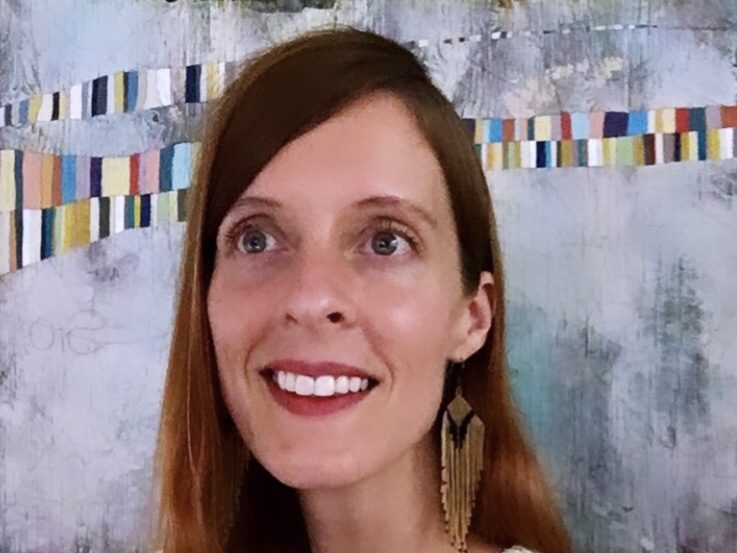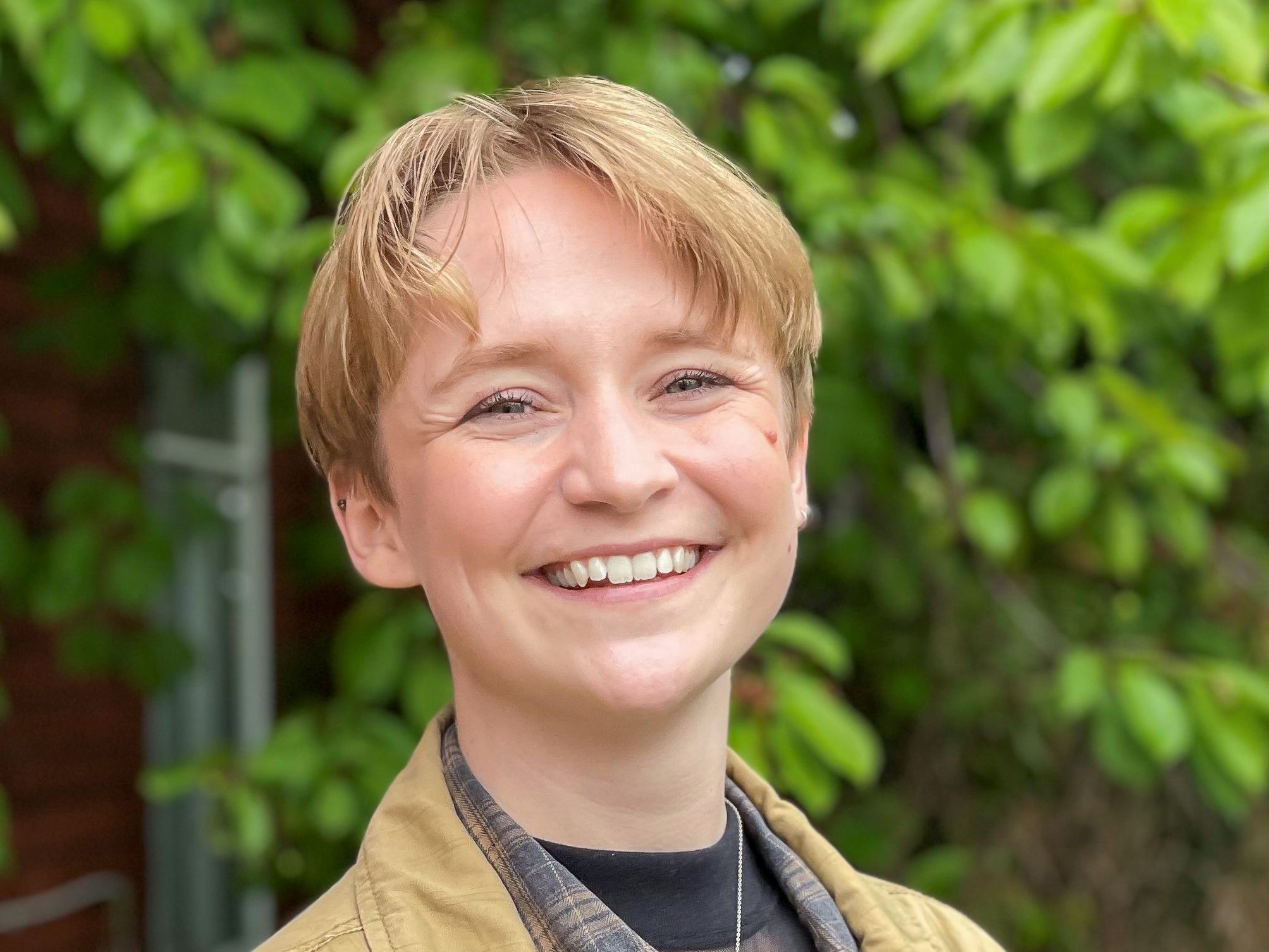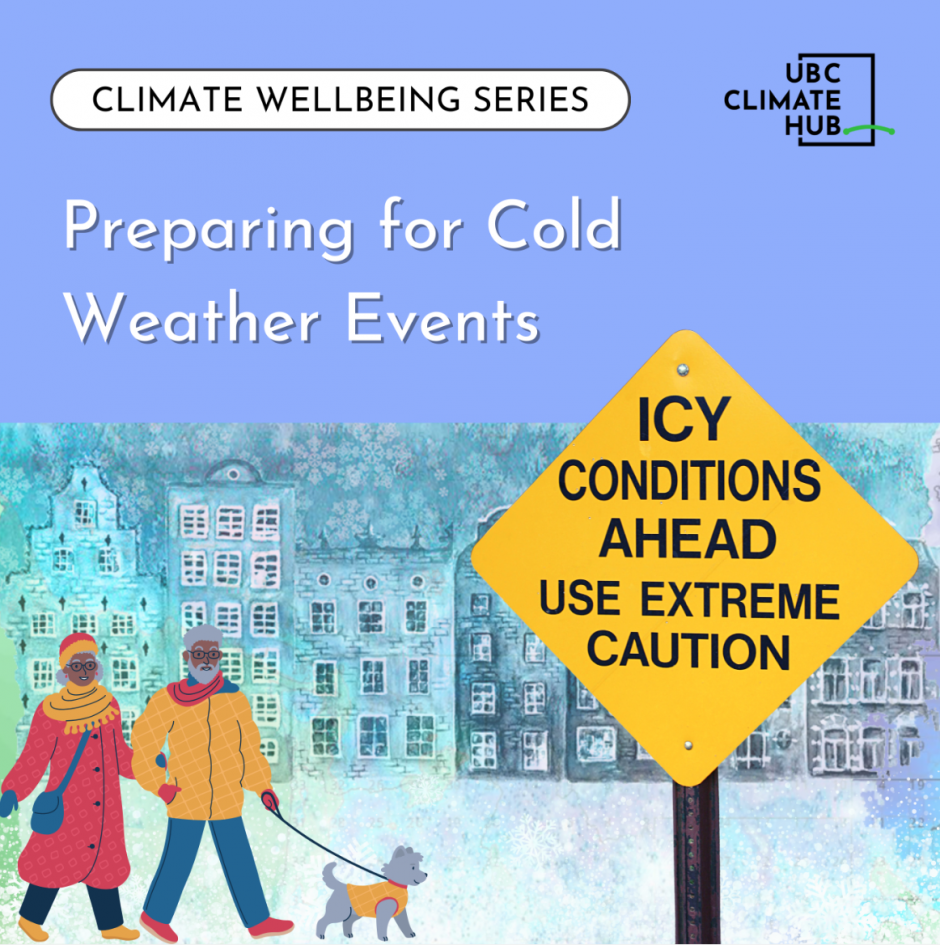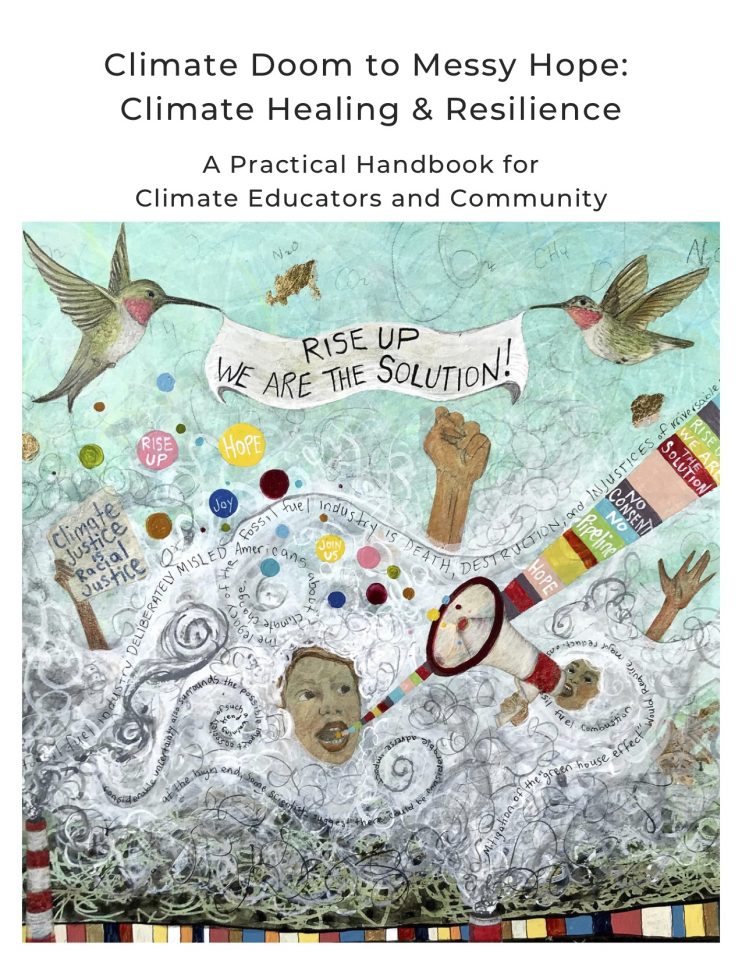
Meghan Wise, Climate Hub Coordinator

Lea Anderson, Climate Hub Wellbeing Lead
Wednesday, January 10, 2022
Interview by Fumika Noguchi, Climate Emergency Response team
The UBC Climate Hub is a student-led university-wide initiative that aims to connect and empower university and community stakeholders to take bold climate action for a just future. The Climate Wellbeing Engagement Network is one of their core projects dedicated to helping guide and prepare the UBC community and beyond when facing scenarios caused by the climate emergency such as extreme weather events, grief, anxiety, and stress. Climate Hub received funding from the Climate Emergency Fund which has helped accelerate and expand its critical initiatives.
Meghan Wise is the Climate Hub coordinator, where she has led numerous projects on climate change mental health and wellbeing and helped develop and facilitate the Climate Wellbeing Engagement Network. Lea Anderson is the Climate Hub Wellbeing lead and a current graduate student in the Resources, Environment, and Sustainability program with research interests in environmental and cultural values and human wellbeing.
Join us in this Q and A with Meghan and Lea as they discuss the impact of the climate emergency on today’s youth and how wellbeing is more important now than ever before.
WHAT IS YOUR CLIMATE STORY?
Lea: In elementary school I had a teacher who had these big flowering shrubs growing outside of his classroom. One day we were looking at the plants, and he mentioned that the flowers had been blooming earlier and earlier every single year because of global warming. That moment sticks out to me because I remember already feeling terrified of what was happening to the world. It added a huge degree of anxiety to my life from very early on. I was bound up in this idea that the world around us was hurting and changing and that we should be doing something to stop it. The feelings of inevitability, loss of control and not knowing what the future would look like were always there.
I didn’t begin addressing my anxiety through climate action until much later. I did my undergrad in English literature at UBC. In the last year of my program, I specialized in “ecogothic,” which is a genre that focuses on how experiences of trauma and emotions like grief and anxiety are expressed through portrayals of the environment. I had always felt connected to narratives and the study of English literature, but that was when I realized there was space for connecting narratives and experiences of anxiety and grief to climate action. I then applied to my current program, called Resources, Environment, and Sustainability where I’ve been studying the social science of how emotions and subjective wellbeing are affected by the environment and how those experiences affect the environment in turn.
As I was studying these topics, I came across the Climate Wellbeing Lead position at the Climate Hub and felt immediately connected to the role. Through this position, I’ve met Meghan and all the wonderful people at the Climate Hub. It’s been an incredible experience of connecting with people who are doing amazing work to support our campus and local communities, and broader human-ecological communities.
Meghan: I have to start my climate story with my dad. My dad grew up with a lot of trauma as a child. Throughout my childhood, my dad would take us into the woods every chance he could. We lived in the BC interior surrounded by wooded areas that we could drive half an hour to. We were fairly poor, so it was a way of doing things as a family and be in nature. My dad loved being in the woods. He would teach us how to identify animal tracks, types of trees, how to read the weather, things like that. He was passing on what he learned growing up from spending time in nature. These experiences instilled in me a deep sense of awe, respect, and connection to nature.
It wasn’t until I was much older that I was able to reflect on why my dad spent so much time in nature. For him, being in nature was therapy. It was his way of finding peace and feeling a sense of wellbeing. Growing up I had this lens of nature as wellbeing, and as we look around us, we can see connections between systems, impacts on nature, our own wellbeing and on communities. In my home community, the forests where I grew up and learned to love nature have been burning more and more every year. Witnessing these places that mean so much be incinerated around you makes you feel this deep sense of loss. Today, I am increasingly conscious of how human systems and dynamics of sociopolitical relationships impact these spaces and places.
When I went back to school for my undergraduate degree, I made sure every course I took and paper I wrote focused on connecting it to climate change. Then I did my masters at UBC also focusing on issues and impacts of climate change. As a master’s student, I was also a Sustainability Scholar at the Sustainability Hub researching the intersections of climate change, mental health and community resilience. That led into me working with the Climate Hub supporting community engagement and the climate wellbeing working group for the Climate Emergency Report and Recommendations. This then led to working at the Climate Hub as the climate policy lead and transitioning into my current role as Coordinator.
WHY DO YOU THINK THAT CLIMATE WELLBEING IS MORE IMPORTANT NOW THAN EVER BEFORE?
Meghan: We are continually raising our awareness and understanding of the magnitude and interconnected impacts. When we think about wellbeing, we are talking about fundamental existence, collective happiness, collective health, and being able to live as full beings.
The term climate change can be amorphous in meaning to many. Climate change is made-up of many interconnected parts and issues. Wellbeing is more important than ever because the processes and impacts of climate change are creating multifaceted, multilayered inequitable impacts on our collective health and wellbeing. For example, air pollution from fossil fuels causes all sorts of respiratory diseases and research has come out linking fossil fuel air pollution to over 10 million deaths annually and approximately a million stillbirth deaths annually. When we see how climate change is still magnifying, driven by causes like fossil fuels, deforestation, and disproportionate hyper-consumerism, we know we are on an upward trajectory of expanding negative impacts on our wellbeing in the immediate years to come. Wellbeing is a fundamental dynamic that must be at the centre of what we understand our responses to require at this time.
WHAT ARE SOME OF THE CHALLENGES YOU HAVE FACED IN CLIMATE WORK AND HOW IF POSSIBLE HAS THE CEF ALLOWED YOU TO OVERCOME THEM?
Meghan: I have navigated a lot of climate anxiety, climate distress, climate grief and climate trauma. I’ve lived through no less than six major climate impacts including multiple forest fires, forest fire evacuation, weeks of smoke pollution, flooding, heat domes, and deep freezes. Climate change literally keeps me up at night, then I get up in the morning to work on climate programming. There is this coexistence of despair and an understanding I have to keep doing something because I do not have the luxury to give up and a privilege I cannot squander.
At a community level, we must recognize the inequities and injustices that interconnect with climate change issues, and how we could/should be doing things differently. A collective or community level seems complicated, but there are many people working on climate action and solutions through climate justice lenses. Identifying, magnifying and scaling up these equitable and justice focused actions can help a lot of people.
On a systemic level, there is the challenge of being told that it is individuals who need to solve a problem that is fundamentally systemic. The challenges of systemic impacts and the narratives of fossil fuel industries, big mining or deforestation corporations for economic profit seems insurmountable. But we know these systems didn’t always exist and they won’t always exist, so how do we help the evolution or the deconstruction and reconstruction of systems?
When I tie these challenges back to the Climate Emergency Fund, I think about all the amazing programming students have developed at Climate Hub. Programs like the Climate Justice Research Collaborative (CJRC) is funded by the CEF. This program allows us to help community partners integrate climate justice principles or recommendations while giving students a chance to develop critical research skills and an understanding of how to connect climate change issues with community needs and wellbeing. The CEF supports the Climate Wellbeing Engagement Network (CWEN). This is also a created program that provides workshops, strategies, tools, and connections that help uplift, deepen, and expand one’s ability to navigate climate grief, distress, trauma, and connect them to important climate emergency preparedness resources. The CEF has allowed us to meet key UBC Climate Emergency Strategic Priority issues and challenges in macro and micro ways, and you never know what effect even a small ripple of climate action will have to advance climate wellbeing and climate justice.
HOW DO YOU THINK THE CLIMATE EMERGENCY IMPACTS THE WELLBEING OF YOUTH DIFFERENT FROM OTHER GENERATIONS?
Lea: Younger people experience the climate emergency at the timescale of a lifespan. We have our whole life ahead of us to see continued impacts and deterioration created by the climate emergency. But I also think many young people feel a profound sense of shared loss and grief for the possibilities and choices that have been taken away from them.
Many people use humor to navigate these feelings. My friends and I have this running joke about how our parents keep asking when we’re going to have kids, and our answer is “When the climate emergency is taken care of.” It feels like certain choices about our lives, that people from other generations were able to make for themselves, were taken away from us by the actions of other people, systems, and powerful actors that led to the climate emergency. The climate emergency has taken what should have been personal choices away from younger generations. That experience creates feelings of anger, grief, loss, and frustration.
These feelings are often felt acutely by youth, and I think that is why so many young people have come to the climate movement. We have seen it in youth marches, movements driven by youth, and young people turning out to vote. These emotions drive people to action in an incredible way, and I think there are important connections between managing climate emotions and wellbeing impacts and taking action. Many people find that their work in addressing the climate crisis can be beneficial to personal, collective, and systemic wellbeing. I think that is why we have seen such huge youth engagement, because engagement is helpful for navigating climate anxiety. But action is often coupled with feelings of grief, loss, frustration, and a sense of unfairness.
MOVING FORWARD DOES THE CLIMATE HUB HAVE PLANS TO EXPAND THESE SERIES AND WHAT CAN WE EXPECT?
Lea: We have tons of plans for the Climate Wellbeing Engagement Network and for the resource series. We recently released a resource that is relevant to the current weather called Preparing for Cold Weather Events. We have several wellbeing resources for climate events that take place during the summer and fall such as heat waves, wildfires, and flooding. Now we are seeing climate impacts happening throughout the year, so we are aiming to provide wellbeing resources for communities that are relevant for every month of the year.
We are also in the middle of the wellbeing resource translation project. All the climate wellbeing resources are currently in English, but we want them to be available to communities throughout Metro Vancouver and the Lower Mainland, or even globally! We have been working on translating a set of the resources into the most frequently-spoken languages in the Lower Mainland including Filipino, Punjabi, Cantonese, and Mandarin.
We have also continued expanding our workshop series, and have facilitated two so far this year. The most recent one focused on climate wellbeing for people doing climate justice research and additional wellbeing dynamics for people who are working in climate action spaces and experience high rates of burnout.
Meghan: Another Climate Wellbeing Series in the works will focus on how systems relate to climate wellbeing. In our climate wellbeing workshops, we often talk about systems like colonialism, white supremacy, capitalism, and neoliberalism. This series will explore climate change wellbeing in relation to these concepts.
WHICH WELLBEING SERIES IS YOUR FAVOURITE OR YOU BELIEVE IS THE MOST IMPORTANT NOW AND WHY?
Lea: One of the resources that brings me the most joy is the Messy Hope handbook that Meghan developed and released. Rather than minimizing climate anxiety as something that is wrong or should be avoided, researchers suggest that we frame it as a rational response to the crisis that we are experiencing. Messy Hope recognizes that climate anxiety is often going to exist in tandem with other emotions experienced within the climate movement such as hope, joy, and happiness. Messy Hope is not a dichotomy between good and bad emotions, but instead recognizes that they will often exist together.
Meghan: One I appreciate is the Air Pollution Impacts on Community Mental Health and Wellbeing resource. I think it’s an underestimated climate impact that has a magnifying, devastating impact on community health and wellbeing. One of the most important things we can hope for out of this resource series is to support people’s understanding of how to engage strategies, build understanding and relationships in their communities, and push for systemic change.
Air pollution draws a direct causal relationship to fossil fuels, and fossil fuels are the primary driver of climate change, so I appreciate that it is helping build a network of understanding of causal relationships to climate processes and impacts.
When we say ‘climate emergency’ the idea of “emergency” can be amorphous. It can be hard for people to understand what that actually means in a tangible sense. But if we say that it’s a health emergency, or an air pollution emergency for example, the threat or risk to our wellbeing becomes a little clearer, as do the potential actions needed to address it. We all understand health, so I think it helps people connect to issues that are personally intimate and in ways that are maybe less daunting.



